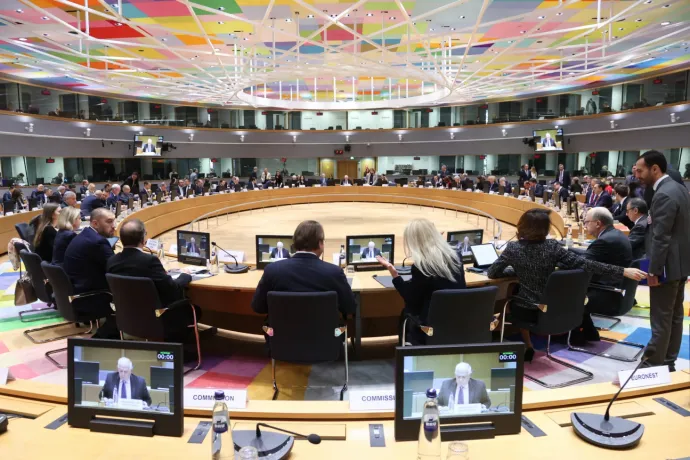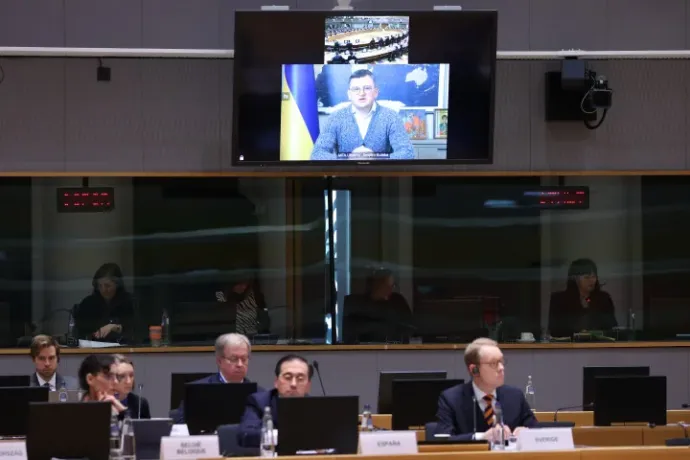
The Czech government, which holds the rotating presidency of the EU Council of Ministers, announced on Twitter late on Monday that they had found a solution to the issues blocked by Hungary and had also reached an agreement on Hungarian EU funds, EUrologus reports.
The four issues on which the ambassadors accredited to the EU (COREPER) have reached an agreement in principle are:
- the €18 billion in aid for Ukraine;
- the 15% global minimum tax;
- conditional approval of the Hungarian recovery plan for €5.8 billion (nearly HUF 2,400 billion) in non-repayable funding;
- and the suspension of Hungarian EU funds proposed in the rule of law procedure – the original recommendation has been somewhat reduced, the agreement is to suspend the disbursement of 2 600 billion forints.
The current agreements are expected to be approved by member state ministers in writing by Wednesday, ahead of Thursday's EU summit. These were the four issues that the Czech presidency of the Council put together into one package at the finance ministers' meeting on 6 December, which was still undecided on these matters at the time.
On the first two issues, the Hungarian government was expected to change its previous position. According to Népszava's Brussels correspondent and sources of Portfolio,
the government has agreed to support Ukraine through a joint EU debt solution. As recently as last Tuesday, the Hungarian government had blocked the original loan plan,
which would have been guaranteed by a gap between spending and revenues in the joint EU budget, but would have required a unanimous decision. So on Saturday the door was also opened to "Plan B", whereby member states – even if only some of them – would bilaterally guarantee the EU loan. According to both Szabad Európa and Népszava's Brussels correspondent, Hungary also voted no on Saturday. The Orbán administration would have provided its share bilaterally, according to a resolution.
Euronews reports that the Czech presidency confirmed to them that Hungary had given up both its veto on the loan for Ukraine and the global minimum tax. However, on the former, unlike on the other three issues, no new communication was posted on the Council's website until 3 a.m. Therefore, apart from a succinct tweet from the Czech presidency, no more is officially known about the aid to Ukraine and the exact agreement, details of which will are expected to be revealed on Tuesday.
The ambassadors also unanimously agreed to support the global minimum tax, which the Hungarian government had previously also opposed. A few hours before the late-night announcement, the pro-government Világgazdaság reported, citing its sources, that Hungary had been granted an exemption on the global minimum tax. According to this, the Council of the European Union would agree to include the Hungarian business tax in the global minimum tax, meaning that the 9 percent corporate tax rate would not have to be raised.
On the other two issues, member states agreed to approve the Hungarian Recovery Plan (RRP), but its payment will be made subject to strict conditions, in line with the European Commission's proposal.
"The plan also includes a series of key institutional reforms aiming to strengthen the rule of law. These reforms are also designed to protect the Union's financial interests and are expected to improve the efficiency and resilience of the economy by strengthening the fight against corruption, promoting competitive public procurement and reinforcing the independence of the judiciary. These reforms are formulated in a total of 27 'super-milestones' which must be fully and correctly implemented in order for Hungary to receive any payments under the RRF (the Recovery Fund – ed.)," they wrote.
In addition, a decision was reached on Monday to suspend EU support for some of the Hungarian cohesion efforts, but in contrast to the European Commission's previous proposal, updated on Friday, which was virtually unchanged,
rather than 65 percent, only 55 percent of three Hungarian operational programmes will be suspended. This means that the amount of money proposed to be frozen has been reduced. This means that instead of €7.5 billion euros, €6.3 billion of cohesion funding (around 2,600 billion forints instead of 3100 billion) will be suspended.
“Given the remedial measures so far adopted by Hungary are affected by significant weaknesses which seriously compromise their adequacy to address the breaches of the principles of the rule of law identified by the Commission in its proposal, the Council considers that the ensuing risk for the budget of the Union remains high. However, in light of the number and significance of remedial measures that have been satisfactorily implemented by Hungary and given the degree of cooperation it would be a “reasonable approximation” to establish the remaining risk for the budget at 55% of the commitments of the programmes concerned.” – the press release published on the Council’s website states.
Thousands of billions of forints of funding suspended, but proposed amount reduced
Two issues had to be decided on regarding EU funds for Hungary. The first is cohesion funding, which – as of 2021 – makes up a significant part of the seven-year EU budget . To allocate these funds, an agreement must first be reached in a partnership agreement about roughly how the money would be spent, and then the plan is to be broken down into operational programmes.
In April, the European Commission took the first and so far only initiative to launch a new conditionality mechanism against the Hungarian government. An unofficial correspondence had already been going on between the two parties. During this time, the Hungarian government had tried to reassure the Commission with 17 commitments. The EU body concluded that in principle, if properly implemented, these could address the rule of law objections, but in the meantime on 19 September it recommended the suspension of 65% of three Hungarian operational programmes. The reason for the proposed freeze is that the EU body believes that Hungary is violating the rule of law, which poses a threat to the EU budget.
The Commission gave the Hungarian government two months to make progress on the reforms, but ultimately found shortcomings and risks on several points at the deadline, and sent the proposal for suspension unamended to the meeting of finance ministers of the member states on 6 December. However, they did not agree on a decision there, but asked the European Commission to give a new opinion by the end of last week, taking into account the developments since 19 November. The fresh assessment has not improved much, as the Hungarian government only managed to provide a guarantee to one out the dozen objections . This meant that the proposal for the suspension of €7.5 billion (around 3,100 billion forints at current exchange rates) in funds still remained.

According to Politico, the Netherlands and Sweden were among the countries that wanted the full amount proposed by the Commission to be suspended, while France and Germany argued for a reduction in the amount (presumably fearing the precedent value of the decision in other areas, softening the vetoes on the global minimum tax and the Ukraine loan, among others, and as a recognition of the progress of the commitments made by the Hungarian government). If no decision had been made by 19 December, the procedure would simply have ended without any consequences.
Following this, it was agreed at the ambassadors' meeting on Monday to suspend funds, but to reduce the amount to €6.3 billion.
The frozen funds will be made available to Hungary if the government completes the necessary reforms within two years.
The size of the suspended amount has more of a theoretical than a practical significance for the time being, as Hungary currently has no access to the cohesion funds anyway. The country's government still needs to agree with the European Commission on a partnership agreement outlining how it will be spent, and then on the operational programmes.
The other decision concerns the recovery fund. Citing the setback caused by the coronavirus, a few years ago, alongside the "normal" budget, the EU set up a temporary recovery fund. Hungary has applied for its share in the non-reimbursable part. To use it, member states had to submit a national investment and reform plan with clear 'milestones' and targets. At the end of November, the European Commission recommended to national ministers that they approve the Hungarian government's recovery plan – the last of the member states to do so.
Hungary's advance from its €5.8 billion share of the fund is roughly €730 million, or around 300 billion forints, but the full amount can only be used if it is linked to milestones. As mentioned above, the European Commission has grouped the actions to be taken into 27 points ("super milestones"). Some of these are the 17 commitments the government has made relating to the rule of law mechanism, but several are linked to the judiciary, such as strengthening the powers of the National Council of the Judiciary and ensuring that Hungarian courts can refer to the EU Court of Justice for interpretation of EU law without hindrance.
The stakes of the debate were raised by the fact that a country could miss out on around 70% of the Recovery Fund's funding compared to "normal" budget money if its plan is not approved by the end of 2022. This was also not agreed upon at the finance ministers' meeting on 6 December, only this Monday. Politico reports that the Netherlands has indicated it will abstain on the issue.
Four big issues in the spotlight
In recent weeks, among others, Germany's foreign minister and an EU commissioner have accused the Hungarian government of trying to blackmail other member states on EU funds and the rule of law with a veto in a case demanding unanimity. The Hungarian rule of law case was provisionally put on the agenda of the aforementioned finance ministers' meeting on 6 December, with two items on which even a single member state could have interfered: the global minimum tax and the €18 billion EU loan for Ukraine for 2023.
Then, on 6 December, due to the Hungarian government's explicit opposition and blocking, the finance ministers were unable to vote on all the legislation and amendments needed for the joint EU loan (with the exception of one point where unanimity was not needed), and the global minimum tax was also taken off the agenda.
The Hungarian government has opposed the loan all along, insisting that it would instead help Ukraine bilaterally, with Hungary's €187 million share of the EU's planned €18 billion aid programme. So much so that Minister of Foreign Affairs and Trade Péter Szijjártó was still talking about it on Monday afternoon.

As for the global minimum tax, government representatives said they were reluctant to introduce it, among other reasons, because it would put the country at a competitive disadvantage compared to the United States, where it has not yet been introduced. Indeed, the Hungarian government has been voicing its reservations for some time and, although last year it seemed to have made its peace with the proposal, in the end, they still opposed it.
The Czech presidency had said that it would look at how the other 26 member states can work together to help Ukraine, and by the weekend a plan B had been drawn up to avoid the Hungarian government, but the original solution remained open too.
Czech Finance Minister Zbyněk Stanjura, who chaired the 6 December meeting, said he would address the four issues in one package. He also said that as long as there is no agreement on one of them, there is no agreement on all.
Politico writes that the EU's determination to avoid showing such fissures amid the Russia-Ukraine war also pointed against an agreement among only 26 member states on aid to Ukraine. According to the agenda, it could be as early as Tuesday at noon that the European Parliament will vote on whether to deal with the legislation adopted by the Council on Saturday under the urgency procedure. A decision is expected on Thursday.
For more quick, accurate and impartial news from and about Hungary, subscribe to the Telex English newsletter!